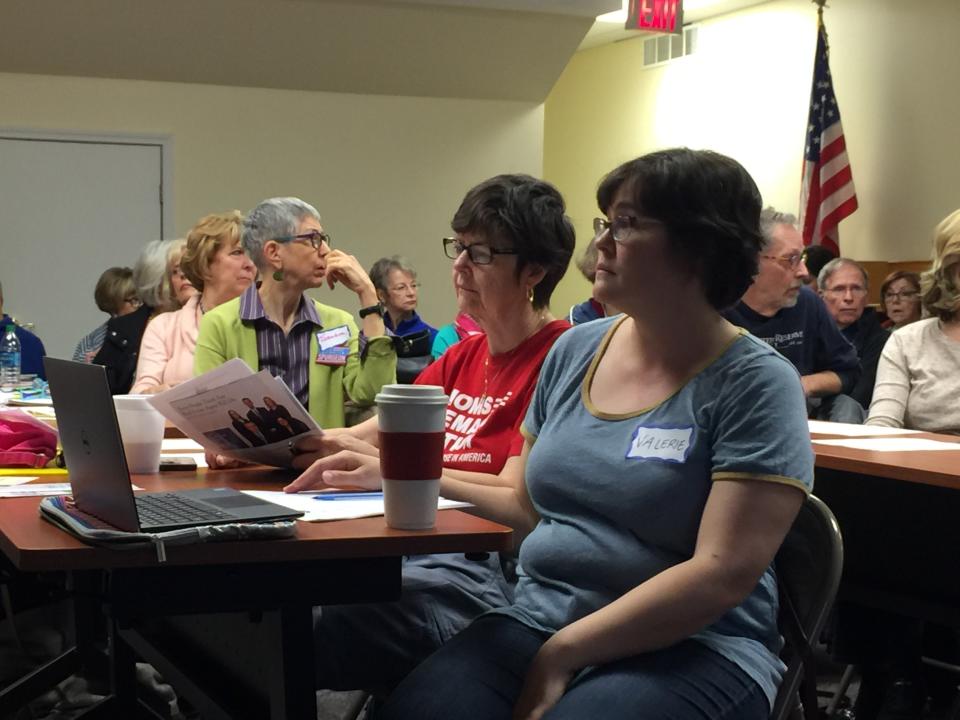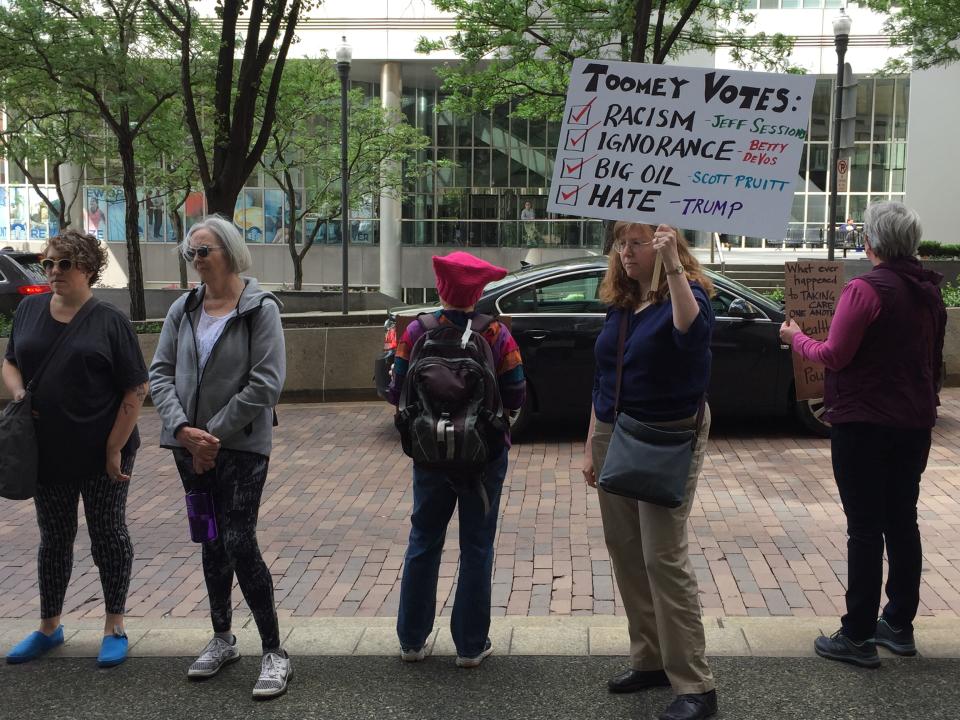The resistance is organized and ready in district where Trump is visiting

MOUNT LEBANON, Pa. — Former Marine Capt. Conor Lamb has been described as a central casting vision of a heartland American politician. A former assistant U.S. attorney general and novice political candidate, he’s running in a special election to replace eight-term Republican Rep. Tim Murphy, who resigned last fall following news reports that the family-values conservative had asked his mistress to get an abortion.
Pennsylvania’s 18th District, including affluent suburbs of Pittsburgh and working-class areas on the West Virginia border, has been the definition of a safe Republican district. Donald Trump won the district by 20 points. It’s not on the Swing Left map for flipping red districts to blue, and it’s not a priority red to blue district for the Democratic Congressional Campaign Committee. In fact it’s so red that in the last two election cycles, no Democrat even challenged Murphy there, allowing him to win each time with 100 percent of the vote.
But Donald Trump’s visit to the district on Thursday to shore up support for the Republican candidate, State Rep. Rick Saccone, a stalwart Trump defender and surprise victor of the GOP primary, shows just how much has changed since the reality TV star was elected president.
Public polling by Gravis Marketing at the start of the year showed Saccone with a 12-point lead, but internal polls show the race much closer, in the single digits. In a low-turnout special election, in an environment where Democratic statehouse candidates in ruby red districts across the country are improving on their party’s 2016 performance by 15 to 27 points, a Democratic victory here no longer looks impossible, even if it the odds remain against it.

But if Lamb has a shot in this race, any shot at all, it will be because of an uprising in the district that began long before his candidacy. Since the 2016 election, a grassroots rebellion has been upending politics as usual in Southwestern Pennsylvania and across the state, driven in large measure by suburban middle-aged women.
If a Democratic wave carries Lamb into office in the March 13 election, it will be one that has been building, drop by drop, since the day Trump was elected.
+++
The story of the fight by Democrats to retake the 18th Congressional District doesn’t start with Murphy’s resignation on Oct. 21, or even with the revelations over the summer that he’d had an affair.
It started a year ago, when women like Lara Huber, 40, went to the Women’s March in Washington D.C., taking their rage and disappointment over Hillary Clinton’s loss and Donald Trump’s victory to the streets. It was the beginning of a process of self-education and activism that has flowered across the state, even in the reddest precincts.
“I was not an activist prior to November 8th,” Huber told Yahoo News at one of the organizing meetings for the activist group 412 Resistance, held in an upstairs backroom at the public library in Dormont, a working-class suburb just outside of Pittsburgh that’s easy to drive to from across the South Hills. “I voted in every election. I read the newspaper. I thought that was good enough.”
After Trump was elected, though, it was clear that wouldn’t be good enough any more. As it did for women in communities across the country, the Women’s March had two powerful effects on her: It created a sense of solidarity and momentum when she was looking for a way to express her despondency over the election outcome, and it suggested concrete steps for action that took her life in a surprising new direction.
“We came off the march and we were like, let’s go, let’s go, let’s go,” said Huber, who lives in Castle Shannon. “And we all started creating these little groups.”

Other women in the South Hills were following similar paths, using step-by-step instructions sent by older national groups such as MoveOn.org and new insurgent ones like Indivisible, along with emails from the Women’s March organization based in New York City.
“The first action was, have a postcard party,” recalled Huber of how 412 — the name refers to the Pittsburgh and Allegheny County area code — Resistance got its start. “And I created a Facebook event, and I invited my friends and thought a few of them would show up and support me — and about 37 people showed up and most of them were not my friends, they were new people.” Today 412 Resistance counts more than 500 members, and is working to elect its most active members to district and county positions within the Pennsylvania Democratic Party, hoping to reshape and reinvigorate it from the inside. And its members are working to elect Conor Lamb – canvassing for him, phone-banking for him, putting up lawn signs and talking to their friends and neighbors about how their lives and communities might be affected by changes to Medicaid and the Affordable Care Act.
Lynn Hughes, 34, a registered independent until Trump’s win radicalized her, tells a similar story. “Before the inauguration, MoveOn.org called for community meetings all across the country to resist Trump at a local level. I was like, I have a house, I can just host a meeting,” she said after a meeting at a Panera in Mount Lebanon co-hosted by 412 Resistance and the group she founded in mid-January, Mt. Lebanon Rise Up. “I never intended to be any kind of organizer really.”
But then she tapped into something, she recalls: “I thought maybe five people would show, and I think there ended up being 20 people, and then we had one person walk in from off the street. She saw my signs, and she parked her car and came in. So then we just started talking about what we should do at a local level. Someone mentioned the Indivisible Guide, and so we kind of became an Indivisible group. People started finding us through there. At our next meeting, we had 60 people, then the meeting after that we had over 100.” Today the group has more than 300 members, and there are at least eight Indivisible groups working in the 18th District to fight the Trump agenda and elect Lamb.
In the group’s early days, Hughes followed the MoveOn.org community meeting agenda instructions, which suggested forming committees. Then those took on a life of their own. The biggest ones focused on gerrymandering — Pennsylvania is one of the most heavily gerrymandered states in the country — and planning for the midterm elections. The goal from the start was to create enough momentum in the district to attract a strong Democratic challenger to Murphy, and provide a deep network of grassroots volunteers, and maybe even money, for that eventual candidate’s campaign to rely on.
They got their chance sooner than expected. “It came about eight months earlier than we had planned. But we were ready,” said Valerie Fleisher, 40, a mother of two and member of 412 Resistance who has since the election begun to consider running for office herself and is now taking a training class for would-be women candidates by Emerge America.

Another Mt. Lebanon Rise Up committee spun off into a group called Mondays with Murphy, targeting Murphy’s field offices around the district with vivid, boisterous — and sometimes musical — protests every Monday that eroded support for him in the district even before his affair went from local rumor to national news.
“I thought, I’m not going to be standing on the sidelines when something so crucial is happening,” said Mykie Reidy, a former Bernie Sanders delegate and part-time copywriter who set up Mondays with Murphy’s planning committee and went on to emerge as a leading activist in the district. “I needed some more bodies on board, especially if we’re going to last until Nov. 2018. And as time went on, every week there was another assault of some kind on people’s rights and their well-being, and it really wasn’t that hard to keep it going because there was a new inflammation all the time.”
Mondays with Murphy morphed, after the congressman’s resignation, into Progress 18 PA. By that point it had more than 500 members. And when the time came for the Democratic Party’s convention to select a nominee, it threw its weight against the main primary competitor to Lamb, Gina Cerilli. A coalition of 10 of the new Southwestern Pennsylvania resistance groups, claiming collectively more than 20,000 members in the 18th District or near enough to it to be a source of volunteer labor for an eventual candidate, sent a letter to the Democratic Party announcing they would not do work on her behalf, owing to her antiabortion position and other actions she had taken to alienate the progressive upstarts.

Further flexing their muscle, members of the resistance groups had also been working to become Democratic committee members so they could attend the more than 500-person convention to select the party’s nominee. They succeeded in winning a small number of slots that allowed them to be in the room where the decision was made. Lamb led six other candidates on the first round of balloting and won overwhelmingly over Cerilli on the second round.
“We were ready to make it competitive in the general election. The fact that a shameful resignation — that he had to leave office in shame only sweetened the deal,” said Fleisher.
+++
Pennsylvania’s 18th District stretches from the gritty working-class suburbs south of Steel City through a stretch of tony communities full of standalone homes where regional CEOs and business leaders reside, continuing south and west through coal-mining communities and rural areas whose rolling hills are indistinguishable from those across the district’s southern and western borders with West Virginia. The residents are more than 90 percent white and substantially more suburban than rural.

It is an oddly shaped district, drawn in the last round of redistricting in the state in such a way as to be especially favorable to Republicans. It covers parts of Alleghany, Greene and Washington counties and a spur juts out to take in part of Westmoreland County to the east.
Activists groups in each of those counties are now doing grassroots volunteer organizing for Lamb — even in the GOP stronghold of Westmoreland County, where Voice of Westmoreland has grown from a lone man holding a banner outside the courthouse a year ago to a group of more than 200.
Angela Aldous, 37, a hospice nurse by day, is one of the lead organizers of Voice of Westmoreland, an issues-based organization that started early last spring when six people who had met protesting outside Murphy’s district office and the local courthouse against Trump’s refugee ban decided to build something more pragmatic and less “sporadic.”
“None of us knew what we were doing,” she said. “So we did that training through Harvard, the Resistance School,” an independent training project created by students at Harvard’s Kennedy School of Government in the spring of 2017. The digital training tools national groups were providing became a huge part of their life. They did MoveOn’s Resistance Summer online trainings as well. “I don’t know how many teleconferences we’ve been on,” Aldous said. She’s also been listening in on conference calls from a local health policy group, and did a Sierra Club lobby day training.
Though formally nonpartisan, the group finds its members casting their lot with Lamb, because Saccone did not answer the group’s policy position questionnaire and Lamb provided detailed answers.
An umbrella group of more than two dozen resistance groups across the state called Pennsylvania Together operated as another tutor. And the educating went both ways, as Aldous and her Westmoreland colleagues were able to provide a perspective from Trump country about what messages they think would work and what could be alienating in communities like hers, where Trump’s personality appeals to many voters. They may, for example, be worried about what impact changes to Medicaid and the Affordable Care Act would have on the local opiate epidemic and people’s ability to get care, for example, she said, and be more open to a local issues-based conversation than any direct attacks on the president.

“It really will be local people talking to each other that will make the difference” in the special election, said Hannah Laurison, a Philadelphia-based leader of Pennsylvania Together and a force behind Tuesdays with Toomey, which has been targeting Sen. Pat Toomey’s district offices with weekly protests since the winter of 2017. “The left is energized and organized in a way it hasn’t previously been, and that makes races competitive.”
The Republican Party is meeting this new energy with more resources than it’s previously had to pour into the 18th District. The Congressional Leadership Fund, a super-PAC affiliated with House Speaker Paul Ryan, has opened two offices in the district and committed to hiring 50 full-time door-knockers to get the vote out for Saccone. Trump’s visit puts the race on the national map, and makes it a fresh test of his ability to influence down-ballot elections after the Roy Moore debacle in Alabama. Mike Pence is scheduled to visit in February and continue the push for Saccone.
Even if Lamb loses on March 13, the resistance groups have no intention of disappearing. There will still be a general election in November, a second chance to elect Lamb or another Democrat, with a longer runway to build the organizing infrastructure they’ve been working to create.
And even if they lose then, every new Democrat they turn out and mobilize, every person who moves from a passive to an active participant in the process is one more person who can achieve one of their other long-term goals: rebuilding the Democratic firewall in Pennsylvania in time for 2020.
_____
Read more from Yahoo News:


